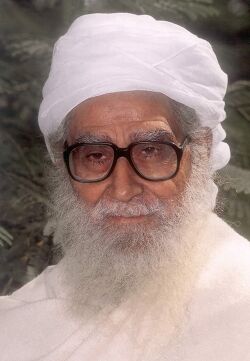Biography:Maulana Wahiduddin Khan
Wahiduddin Khan | |
|---|---|
 | |
| Born | 1 January 1925 Azamgarh, Uttar Pradesh, India |
| Occupation | Islamic spiritual leader, speaker and author |
| Genre | Islamic literature |
| Notable works | Tazkirul Quran |
Wahiduddin Khan (born 1 January 1925), known with the honorific Maulana, is an Islamic scholar and peace activist[1] known for having translated the Quran into contemporary English and for writing a commentary on the Quran.|[2] His televised lectures have appeared on ETV Urdu, Zee Salaam, Bridges TV, ITV, ARY Digital, QTV, Aaj TV, etc.[3]
He has received, among others, the Demiurgus Peace International Award, under the patronage of the former Soviet President Mikhail Gorbachev; India's third-highest civilian honor, the Padma Bhushan, in January 2000[4]; the National Citizens' Award, presented by Mother Teresa and the Rajiv Gandhi National Sadbhavana Award (2009).[5] He was conferred with the Sayyidina Imam Al Hassan Ibn Ali Peace Award (2015) in Abu Dhabi.[citation needed]
Early life
Khan was born in Village Badharia, in district Azamgarh, Uttar Pradesh, India in 1925.[6] He graduated from a seminary of traditional Islamic learning. Like Javed Ahmad Ghamidi, Israr Ahmed and Naeem Siddiqui, Khan also remained in close touch with Amin Ahsan Islahi and Syed Abul Ala Maududi (1903–1979) before opening an Islamic Center in Delhi in 1970.[7][better source needed]
He joined the Jamaat-e-Islami in 1949. He quit it fifteen years later, arguing that Maududi had overly politicized Islam. He set out his ideas in his book, Tabeer kee Ghalati (The Error in Interpretation).[citation needed]
Publications
The Ar-risala (The Message) Urdu magazine was started in 1976 consisting of almost entirely his articles and writing. An English edition of the magazine was started in February 1984 and a Hindi version in December 1990. His articles include 'Hijacking — A Crime',[8] 'Rights of Women in Islam',[9] 'The Concept of Charity in Islam'[10] and 'The Concept of Jihad'.[11] He has written a book on the issue of blasphemy from a dissenting perspective. It was banned in Punjab, the most populous province in Pakistan , on 26 October 1998.[citation needed]
Outlook
Many traditional Islamic scholars find Khan's outlook and opinions distasteful. Some of them have even dubbed him a fitna (source of strife).[citation needed] His advice to Muslims has been to not treat unpleasant or unwanted situations as problems as this would only yield negative results.[12]
List of selected works
He is the author of many books on Islam and modernity,[13] including:[14]
- The Prophet of Peace
- The Quran: A New Translation
- A Treasury of the Quran
- Tazkirul Quran
- Indian Muslims: The Need for a Positive Outlook
- Introducing Islam: A Simple Introduction to Islam
- Islam Rediscovered: Discovering Islam From its Original Sources
- Islam and Peace
- Islam: Creator of the Modern Age
- Words of the Prophet Muhammad
- The Issue of Blasphemy
References
- ↑ All Muslim sects should agree to disagree: Maulana Wahiduddin Khan | Indian Muslims
- ↑ http://www.goodword.net/read_quran_online.aspx A new translation of the Quran by Maulana Wahiduddin Khan
- ↑ "{title}". http://www.goodword.net/maulana_wahiduddin_khan.aspx.
- ↑ Tamara Sonn & Mary Williamsburg, (2004), A Brief History of Islam, Blackwell. ISBN:1-4051-0902-5.
- ↑ "Muslim scholar gets Sadhbhavana Award". Sify.com. 2010-08-20. http://www.sify.com/news/muslim-scholar-gets-sadhbhavana-award-news-national-kiuvkdbhgdg.html.
- ↑ Maulana Wahiduddin Khan
- ↑ Javed Ahmad Ghamidi
- ↑ Hijacking - A Crime
- ↑ Rights of Women in Islam
- ↑ The Concept of Charity in Islam
- ↑ The Concept of Jihad
- ↑ Analysis of the writings of Maulana Wahiduddin Khan - i, The Milli Gazette, Vol. 3 No. 6
- ↑ Ayesha Jalal, Partisans of Allah: Jihad in South Asia, Harvard University Press (2009), p. 266
- ↑ Maulana Wahiduddin Khan - 17 products available
External links
- Maulana Wahiduddin Khan on Muslim leadership in contemporary India - TCN News
- Muslims in India since 1947: Islamic perspectives on inter-faith relations
- The Quran, A new translation by Wahiduddin Khan
- Al-Risala Forum International
- Goodword Books
- Centre for Peace and Spirituality
- Saniyasnain Khan

